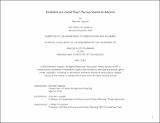Evolution of a Useful Place: The Gas Station in America
Author(s)
Capozzi, Bennett
DownloadThesis PDF (104.7Mb)
Advisor
Ben-Joseph, Eran
Terms of use
Metadata
Show full item recordAbstract
The accelerating transition to EVs in the United States raises questions about the economic viability of fuel retailing in the coming decades; therefore it is necessary to think more deeply about the future of the 150,000 gas stations in the United States, most of which are polluted petroleum brownfields. This thesis uses three research methods to understand the past and present state of gas stations in America and the impact they have had on the built environment: historical research, site visits, and the case study method. First, the thesis explores the way that gas stations in America have adapted their form and program to changes in their political, economic, and technological environments throughout the twentieth century. Then, turning to existing sites, the thesis generates four gas station typologies based on location. These types differ based on key formal and programmatic characteristics, and they are likely to have different reuse futures in a post-gas station world. Photography and site visits capture the way that this process of reuse has already begun; the thesis documents how many former gas stations in the contemporary landscape have been redeveloped, converted to new uses, or abandoned over the past several decades. These adaptations reveal the way that context influences these sites beyond the lifespan of fuel retailing. With the understanding that the transition away from combustion-engine vehicles is likely to continue, the thesis presents a policy framework focused on three scenarios: continued fuel retailing, conversion to EV charging, and industry exit. The framework is designed to help policymakers and planners make informed decisions about how to adapt these sites as the number of gas stations in the United States steadily decreases, leaving a trail of polluted brownfields in its wake.
Date issued
2024-05Department
Massachusetts Institute of Technology. Department of Urban Studies and PlanningPublisher
Massachusetts Institute of Technology